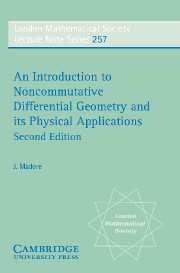Summary
We saw in Section 5.1 that the number of solutions to a differential equation on a manifold V can depend in an essential way on the global structure of V, as is for example encoded in the cohomology ring. It is important then to find an appropriate noncommutative generalization of cohomology. This means in particular that we must be able to express the de Rham cohomology of a manifold V in terms of the algebra of functions C(V). Recall from Section 2.1 that if φ is a map from one manifold into another then the induced map φ* on the algebra of functions goes in the opposite direction. When we speak of chains in this chapter then we mean objects which resemble more the cochains of Chapter 2. We shall see in Example 6.9 below how the 1-chains defined over an algebra of functions are related to 1-cochains on the corresponding manifold. In Section 6.1 we shall give a general construction of a differential calculus which is purely algebraic and which can be used on any arbitrary associative algebra with a unit element including, for example, the algebra of continuous functions on a manifold. It is related to the finite-difference calculus which is used in numerical calculations. A generalization of the de Rham cohomology to noncommutative geometry is cyclic homology. It is defined in Section 6.2. In the last two sections Morita equivalence and the theorem of Loday and Quillen are stated but not proven.
- Type
- Chapter
- Information
- An Introduction to Noncommutative Differential Geometry and its Physical Applications , pp. 241 - 259Publisher: Cambridge University PressPrint publication year: 1999

